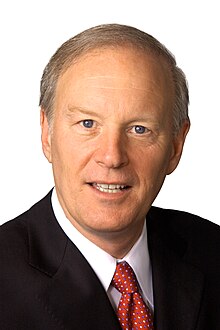Steve Merrill
| Steve Merrill | |
|---|---|
 |
|
| 77th Governor of New Hampshire | |
|
In office January 7, 1993 – January 9, 1997 |
|
| Preceded by | Ralph Hough (Acting) |
| Succeeded by | Jeanne Shaheen |
| Personal details | |
| Born |
June 21, 1946 Hampton, New Hampshire, U.S. |
| Political party | Republican |
| Education |
University of New Hampshire, Durham (BA) Georgetown University (JD) |
Stephen Ernest "Steve" Merrill (born June 21, 1946) is an American lawyer and Republican politician from Manchester, New Hampshire. He served as the 77th Governor of New Hampshire from 1993 to 1997.
Merrill was born in Hampton, New Hampshire. He studied at the University of New Hampshire, graduating from it in 1969. He received his J.D. from Georgetown University Law Center in 1972.
He served in the Air Force as a lawyer from 1972 to 1976, then became a legal counsel to the Secretary of the Air Force from 1973 to 1975. He finally became a special assistant to the Assistant Secretary of the Air Force from 1975 to 1976. Merrill left military service as a captain, then went to Manchester to practice law from 1976 to 1984.
He served on the staff of Governor Sununu and was the state's Attorney General before being elected Governor. He is known for being the first elected official to coin the phrase, "The New Hampshire Advantage."
Merrill entered the 1992 Republican gubernatorial primary. He won election on his first try at state office; he was reelected with seventy percent of the popular vote.
Even before he entered office Governor-elect Merrill faced a daunting challenge. Public Service of New Hampshire had appealed a special property tax imposed by retiring Governor Judd Gregg and the legislature as a way to balance the state budget, and in December 1992 this tax was declared unconstitutional. Governor Merrill therefore had to speak in his first inaugural address about new ways to meet an anticipated $40 million shortfall in state revenues. He proposed changes in state employees' Workmen's Compensation, and in March 1993 a number of changes in other state taxes, as ways to meet the fiscal emergency; in April 1993 he proposed to the legislature that the state's biennial operating budget be revised downward. But by then the state's economy was beginning to improve. Merrill got full credit in national and state media for fiscal responsibility. Merrill declined to run for a third term citing family obligations.
...
Wikipedia
